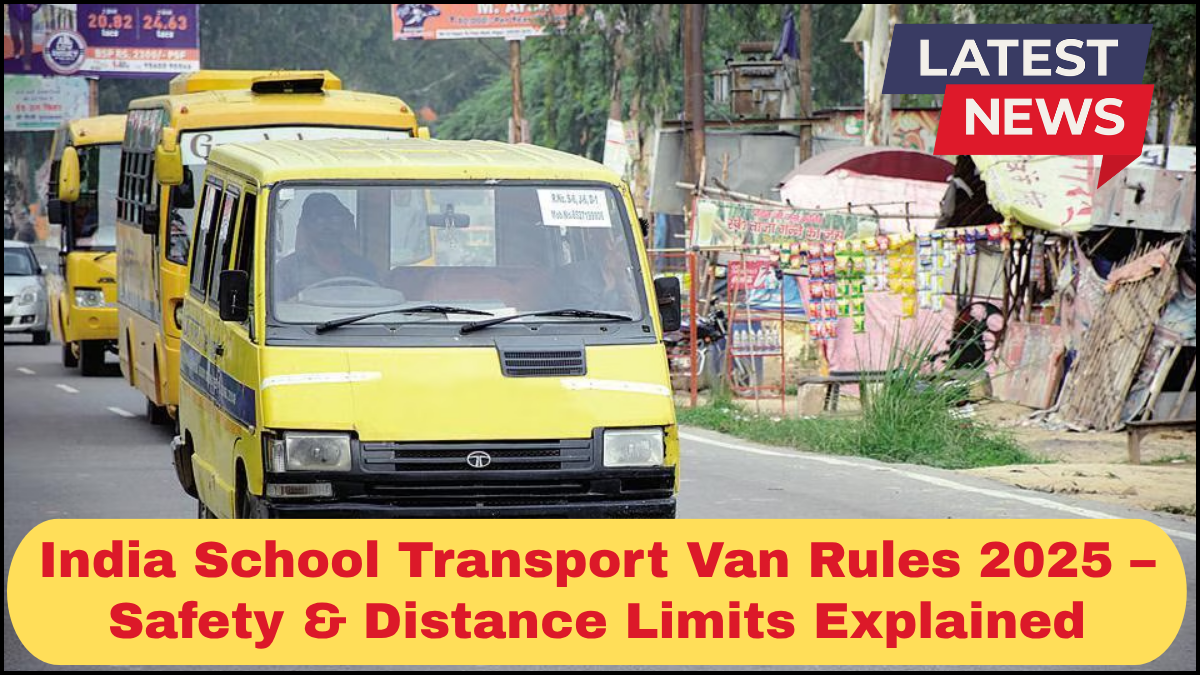The Ministry of Road Transport and Highways (MoRTH) has introduced updated School Transport Van Rules in India for 2025, aiming to tighten safety measures and ensure standardized practices for school commuting across the country. These new guidelines are part of an ongoing initiative to prioritize student safety and permits, reduce road accidents, and streamline regulations for private and commercial school van operators.

Let’s break down the new rules and what they mean for parents, schools, and van operators.
Key Safety Guidelines Under the 2025 School Van Rules
The 2025 regulations emphasize mandatory safety equipment, qualified drivers, and vehicle maintenance protocols. Here’s what’s changed:
Mandatory Installation of Safety Equipment
-
Every school van must be fitted with GPS tracking, CCTV cameras, and a panic button accessible to children.
-
Speed governors must restrict vehicles to 40 km/h in urban areas.
-
Fire extinguishers, first-aid kits, and grill-fitted windows are compulsory.
Driver Qualification Standards
-
Drivers must hold a valid commercial driving license with at least 5 years of clean driving history.
-
Background verification through local police is mandatory.
-
Drivers should undergo annual training on child safety protocols.
Capacity Limits
-
Vans must not exceed the seating capacity approved by the RTO (Regional Transport Office).
-
Standing passengers are strictly prohibited.
These safety mandates aim to reduce instances of overcrowding, reckless driving, and vehicle breakdowns during student transportation.
Distance and Operational Limits for School Vans
The 2025 rules also introduce new distance limits for school vans, ensuring children aren’t subjected to excessively long commutes:
-
Maximum travel time per student should not exceed 60 minutes one way.
-
For rural areas, the distance cap is set at 25 km; for urban zones, it’s 15 km.
-
Vans operating beyond these distances must be converted into larger, better-equipped school buses.
These limits are designed to reduce fatigue and stress for young students, especially in densely populated cities where traffic congestion is a daily issue.
Permits and Documentation Requirements
To operate a school transport van in India, operators must now follow a strict documentation process:
-
Obtain a special school van permit from the RTO, separate from a regular transport license.
-
Submit an annual vehicle fitness certificate, pollution control certificate, and insurance papers.
-
Display the words “School Van” in bold letters on the front and rear of the vehicle, along with emergency contact details.
RTOs have been given authority to suspend or revoke permits immediately if any student safety and permit violations are found.
Role of Schools and Parents in Compliance
While van operators are primarily responsible, schools and parents also share accountability:
-
Schools must verify permit and compliance documents of every van transporting their students.
-
Periodic inspections and feedback surveys are encouraged.
-
Parents are advised to regularly monitor GPS tracking apps provided by van services.
In case of safety violations, both schools and parents can file complaints directly with the local RTO or district education officer.
Penalties for Non-Compliance
Failure to follow the School Transport Van Rules in India can result in:
-
Fines up to ₹50,000 for first-time offenses.
-
Suspension of driving license for drivers violating child safety norms.
-
Immediate cancellation of vehicle permits in severe cases.
These stringent penalties are expected to act as a deterrent for negligence and help build trust in school transportation systems.
Emerging Technologies for Safer School Transport
India is also exploring AI-based driver monitoring systems, real-time route optimization, and automated emergency alert systems. These tools, when integrated with school transport, can provide an added layer of security and transparency for guardians and schools.
Private transport aggregators are beginning to adopt these innovations, raising the bar for safety and efficiency.
FAQs – School Transport Van Rules India 2025
Q1: Can a private van without a school permit still transport children?
A: No. As per the 2025 rules, any vehicle used for school transport must have a special permit from the RTO and comply with all safety norms.
Q2: Who ensures compliance with the rules?
A: The responsibility lies with the van operators, schools, and local RTOs. Schools must verify compliance before hiring any van.
Q3: Are these rules applicable to all states in India?
A: Yes. These are national guidelines issued by MoRTH, although individual states may introduce stricter norms if needed.
Q4: What should parents check before enrolling their child in a school van service?
A: Check for RTO permits, GPS functionality, driver credentials, emergency equipment, and seating capacity compliance.
Q5: What action can be taken if a van operator violates safety rules?
A: Complaints can be filed with the RTO. The operator may face fines, license suspension, or permit cancellation.
click here to learn more